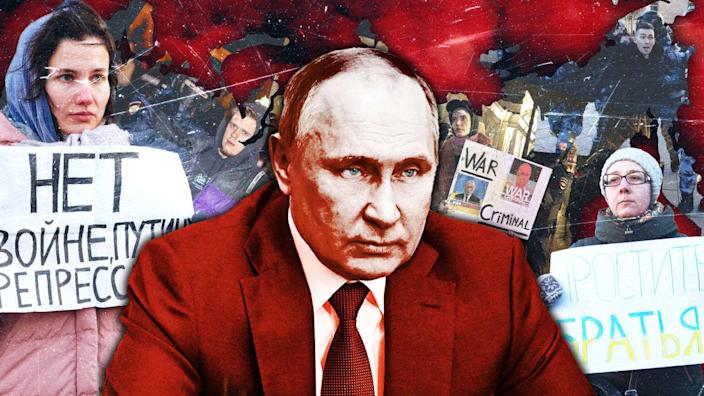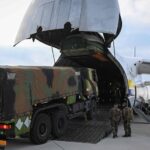
Can the Ukrainians survive the current onslaught by Vladimir Putin’s forces? Awed by their defiance and courage, the international community has responded with an outpouring of sympathy for their cause—and, more importantly, imposed an unprecedented array of sanctions aimed at undercutting support within Russia for Putin’s war. But will any of this stop the Russian dictator?
I was based in Moscow as a Newsweek correspondent in both the Soviet and post-Soviet eras, so many friends expect me to know the answer to those questions.
Putin Isn’t Just Insane. It’s Far Worse Than That.
I certainly don’t know how long the Ukrainians can hold off an army, which, however demoralized and poorly led, still has an overwhelming edge in firepower. But if forced to hazard a guess, I’d say that any short-term Russian victories will only delay, not banish, the prospect of a leadership change in the Kremlin. This is what Putin fears the most and what propelled him to gamble on an invasion of his neighbor in the first place.
He could not allow Ukraine to continue developing into a successful country, linked increasingly to its Western neighbors and already offering its citizens more freedom and opportunities than most Russians enjoy. That’s an example Putin is determined to eliminate.
After more than two decades in power, Putin also fears his domestic critics, like jailed opposition leader Alexei Navalny, who have systematically exposed the wholesale corruption of his regime. As in the late Soviet era, even relatively small protests signal a challenge to the rulers that suggests much wider discontent—and trigger repression, including more arrests and crackdowns on the few remaining independent media outlets.
Opposition leader Alexei Navalny is escorted out of a police station on January 18, 2021, outside Moscow, following the court ruling that ordered him jailed for 30 days.
” data-src=”https://s.yimg.com/ny/api/res/1.2/HVB7xinTA2oSdHhMzGn9Pw–/YXBwaWQ9aGlnaGxhbmRlcjt3PTcwNTtoPTUwMw–/https://s.yimg.com/uu/api/res/1.2/XSpahrdqjoihAMhN7sqYXw–~B/aD04MzU7dz0xMTcwO2FwcGlkPXl0YWNoeW9u/https://media.zenfs.com/en/thedailybeast.com/2f3ba1e4a924c4b1828574a50e3db071″><img alt="
Opposition leader Alexei Navalny is escorted out of a police station on January 18, 2021, outside Moscow, following the court ruling that ordered him jailed for 30 days.
” src=”https://s.yimg.com/ny/api/res/1.2/HVB7xinTA2oSdHhMzGn9Pw–/YXBwaWQ9aGlnaGxhbmRlcjt3PTcwNTtoPTUwMw–/https://s.yimg.com/uu/api/res/1.2/XSpahrdqjoihAMhN7sqYXw–~B/aD04MzU7dz0xMTcwO2FwcGlkPXl0YWNoeW9u/https://media.zenfs.com/en/thedailybeast.com/2f3ba1e4a924c4b1828574a50e3db071″ class=”caas-img”>
Opposition leader Alexei Navalny is escorted out of a police station on January 18, 2021, outside Moscow, following the court ruling that ordered him jailed for 30 days.
Alexander Nemenov/AFP via Getty Images
All of which stirs memories of my first posting to Moscow in 1981. By then, Communist Party leader Leonid Brezhnev had been in power for 17 years, which seemed like a lifetime to most of my Russian friends. He died the following year, but he was initially succeeded by apparatchiks of a similar mold, which meant that the sclerotic Soviet system was largely untouched. The physicist Andrei Sakharov, the country’s most famous dissident, remained in internal exile in Gorky (now Nizhny Novgorod), and there appeared to be no prospect for real change.
Angry about my reporting on stories about everything from corruption in high circles to popular discontent with widespread food shortages and the Soviet war in Afghanistan, the authorities expelled me after fourteen months, accusing me of “impermissible methods of journalistic activities.”
My last trip before my expulsion was to Tajikistan, the Central Asian republic that borders Afghanistan. Most of the young men I talked to were clear about their feelings on the conflict on the other side of the border. “Many people from here have died in Afghanistan,” a Tajik soldier told me. “Mothers get telegrams that their sons have been killed and their bodies are being returned…No one wants war, no one wants to die.”
Putin Finally Cops to Dead Russian Troops in Ukraine
The Brezhnev regime tried to convince its people that it was fighting a war against Afghan “counterrevolutionaries,” just like the Putin regime is portraying the Ukrainians as Nazis—totally ignoring the absurdity of doing so in the case of a country with a Jewish president and a political system that Russians can only dream about.
While some Russians certainly believe the barrage of official propaganda about how the army is on a mission of “liberation,” skepticism—and outright dissent—is far more pronounced now than it was in the 1980s. This is true for many of the young Russian soldiers who were stunned to find themselves fighting in Ukraine, and for their family members who are terrified about their fate.
It is not only civilians and lowly soldiers who are alarmed by the current situation. Last month, Russian Army General Leonid Ivashov, a staunch Kremlin critic, claimed widespread support among his fellow retired officers for his statement denouncing Putin’s “criminal policy” of pushing the country to war.
Both the 1980s and now have been marked by the demoralization of much of the Russian population. In the earlier period, one consequence was that a growing number of writers, artists, musicians and activists were exiled, emigrated or defected. Among them was Yuri Lyubimov, the director of the Taganka Theater that had staged artistically and politically daring productions until he lost his job and was expelled from the Communist Party. In April 1984, I interviewed him in Florence, where he was directing Rigoletto. His reflections then could easily apply to today’s Russia.
Lyubimov bemoaned the exodus of so many talented people from Russia, calling it “a national tragedy, the spiritual impoverishment of the nation.” Right now, many Russians are clamoring to get on the limited number of planes still able to fly out of the country. The exodus is even greater—and much more frantic—this time.
Lyubimov also bemoaned the growing isolation of his country, the result of the backlash prompted not only by the invasion of Afghanistan but also the imposition of martial law in Poland to suppress the Solidarity movement. This had resulted in boycotts and sanctions by Western nations.
Nonetheless, Lyubimov held out the hope that the Kremlin rulers’ “return to Stalinism” could be reversed. “Even in the party and at the top there are people who understand that this is a pernicious policy and that the country is losing prestige and authority,” he said. “You cannot construct everything only on tanks, threats, and the methods of force. I am far from alone in this view.” Putin’s critics would say exactly the same thing.
Lyubimov would be proven right when Mikhail Gorbachev took over in 1985, casting himself as a new type of party leader. He introduced the policy of glasnost (openness) in the naïve belief that he could save the communist system by reforming it. Instead, it collapsed altogether. But to his credit, he largely refrained from resorting to force to push back the clock and preserve his own power. In the midst of those upheavals, Lyubimov and many other famous exiles returned to Moscow.
Of course, Putin has worked assiduously to reinstate a brand of authoritarianism and imperialism that his pre-Gorbachev predecessors would largely approve of. Yet that is not a long-term winning proposition, no more than when the Communist hardliners were in power.
Russian President Vladimir Putin, surrounded by top military officers and officials, tours a military flight test center in Akhtubinsk on May 14, 2019.
” data-src=”https://s.yimg.com/ny/api/res/1.2/NmfFLSmXu2Ph_8em5rNZTw–/YXBwaWQ9aGlnaGxhbmRlcjt3PTcwNTtoPTQ5MA–/https://s.yimg.com/uu/api/res/1.2/eKN3pCDxnupLL9pxM95oAA–~B/aD04MTQ7dz0xMTcwO2FwcGlkPXl0YWNoeW9u/https://media.zenfs.com/en/thedailybeast.com/2c1a3eb0ef25f5fd0af707f020efb052″><img alt="
Russian President Vladimir Putin, surrounded by top military officers and officials, tours a military flight test center in Akhtubinsk on May 14, 2019.
” src=”https://s.yimg.com/ny/api/res/1.2/NmfFLSmXu2Ph_8em5rNZTw–/YXBwaWQ9aGlnaGxhbmRlcjt3PTcwNTtoPTQ5MA–/https://s.yimg.com/uu/api/res/1.2/eKN3pCDxnupLL9pxM95oAA–~B/aD04MTQ7dz0xMTcwO2FwcGlkPXl0YWNoeW9u/https://media.zenfs.com/en/thedailybeast.com/2c1a3eb0ef25f5fd0af707f020efb052″ class=”caas-img”>
Russian President Vladimir Putin, surrounded by top military officers and officials, tours a military flight test center in Akhtubinsk on May 14, 2019.
Alexey Nikolsky/AFP via Getty Images
Compared to the early 1980s, there are many more Russians who want to live in a normal country, who at least for a while felt that they were almost already doing so, and dread the prospect of going through another long period as a pariah state. When I asked Lyubimov if his message was one of optimism, despite everything, he replied: “There’s the aphorism: a pessimist is a well-informed optimist.”
In that sense, I feel the same way about Russia today. Unless the current war, which is a tragedy for both Ukraine and Russia, prompts a long overdue upheaval in the Kremlin, the pessimist within me will dominate, and Ukraine will continue to bear the brunt of the lethal consequences. But the Russians will—and already are—feeling the consequences as well.
That worst-case scenario will rebound against Putin at some point, which is a conviction that nurtures the optimist within me even now. His war on Ukraine is the beginning of the end for him, no matter how long that beginning takes.
Get the Daily Beast’s biggest scoops and scandals delivered right to your inbox. Sign up now.
Stay informed and gain unlimited access to the Daily Beast’s unmatched reporting. Subscribe now.




